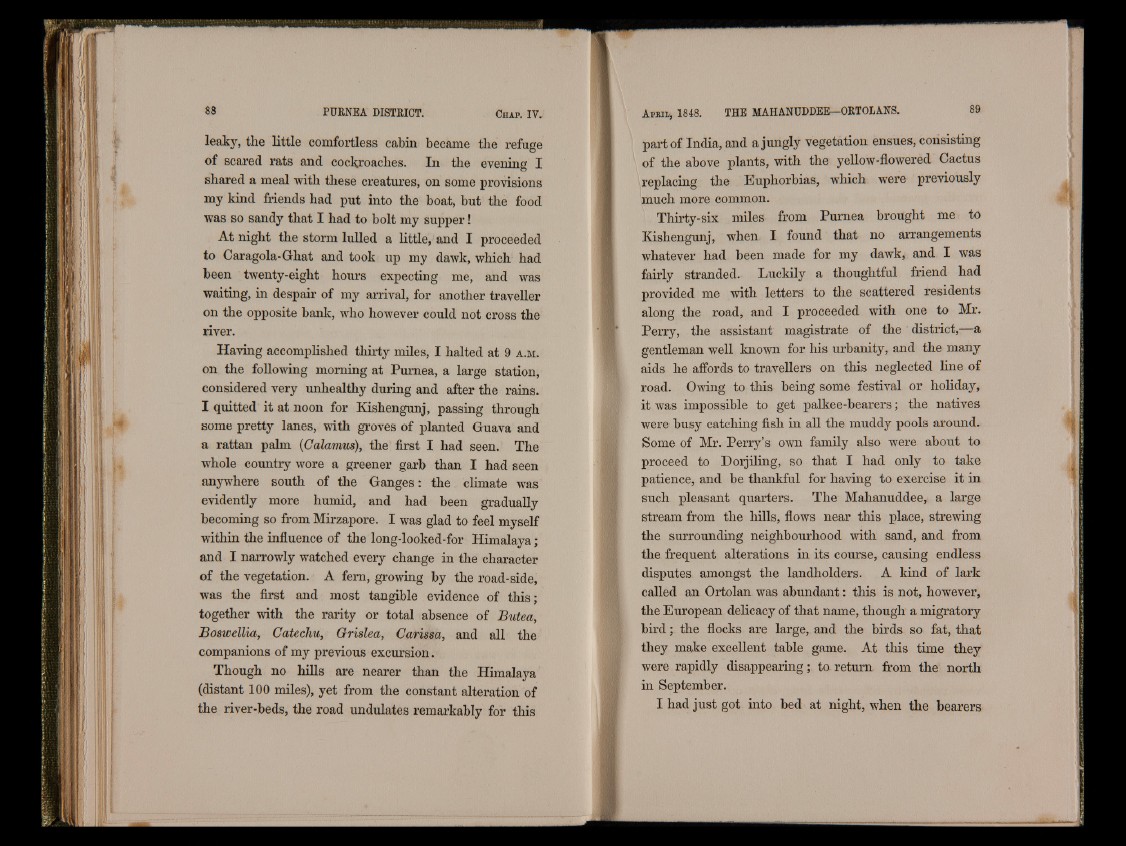
leaky, the little comfortless cabin became the refuge
of scared rats and cockroaches. In the evening I
shared a meal with these creatures, on some provisions
my kind friends had put into the boat, but the food
was so sandy that I had to bolt my supper!
At night the storm lulled a little, and I proceeded
to Caragola-Ghat and took up my dawk, which had
been twenty-eight hours expecting me, and was
waiting, in despair of my arrival, for another traveller
on the opposite bank, who however could not cross the
river.
Having accomplished thirty miles, I halted at 9 a .m .
on the following morning at Pumea, a large station,
considered very unhealthy during and after the rains.
I quitted it at noon for Kishengunj, passing through
some pretty lanes, with groves of planted Guava and
a rattan palm {Calamus), the first I had seen. The
whole country wore a greener garb than I had seen
anywhere south of the Ganges: the climate was
evidently more humid, and had been gradually
becoming so from Mirzapore. I was glad to feel myself
within the influence of the long-looked-for Himalaya;
and I narrowly watched every change in the character
of the vegetation. A fern, growing by the road-side,
was the first and most tangible evidence of this;
together with the rarity or total absence of Butea,
Boswellia, Catechu, Grislea, Carissa, and all the
companions of my previous excursion.
Though no hills are nearer than the Himalaya
(distant 100 miles), yet from the constant alteration of
the river-beds, the road undulates remarkably for this
part of India, and a jungly vegetation ensues, consisting
of the above plants, with the yellow-flowered Cactus
replacing the Euphorbias, which were previously
much more common.
Thirty-six miles from Purnea brought me to
Kishengunj, when I found that no arrangements
whatever had been made for my dawk, and I was
fairly stranded. Luckily a thoughtful friend had
provided me with letters to the scattered residents
along the road, and I proceeded with one to Mr.
Perry, the assistant magistrate of the district,—a
gentleman well known for his urbanity, and the many
aids he affords to travellers on this neglected line of
road. Owing to this being some festival or holiday,
it was impossible to get palkee-bearers; the natives
were busy catching fish in all the muddy pools around.
Some of Mr. Perry’s own family also were about to
proceed to Doijiling, so that I had only to take
patience, and be thankful for having to exercise it in
such pleasant quarters. The Mahanuddee, a large
stream from the hills, flows near this place, strewing
the surrounding neighbourhood with sand, and from
the frequent alterations in its course, causing endless
disputes amongst the landholders. A kind of lark
called an Ortolan was abundant: this is not, however,
the European delicacy of that name, though a migratory
b ird ; the flocks are large, and the birds so fat, that
they make excellent table game. At this time they
were rapidly disappearing; to return from the north
in September.
I had just got into bed at night, when the bearers